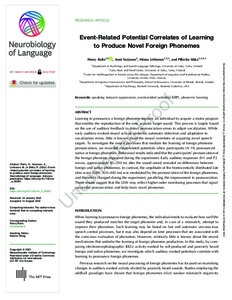Event-related potential correlates of learning to produce novel foreign phonemes
Railo Henry; Varjonen Anni; Lehtonen Minna; Sikka Pilleriin
https://urn.fi/URN:NBN:fi-fe2022112967693
Tiivistelmä
Learning to pronounce a foreign phoneme requires an individual to acquire a motor program that enables the reproduction of the new acoustic target sound. This process is largely based on the use of auditory feedback to detect pronunciation errors to adjust vocalization. While early auditory evoked neural activity underlies automatic detection and adaptation to vocalization errors, little is known about the neural correlates of acquiring novel speech targets. To investigate the neural processes that mediate the learning of foreign phoneme pronunciation, we recorded event-related potentials when participants (N 19) pronounced native or foreign phonemes. Behavioral results indicated that the participants’ pronunciation of the foreign phoneme improved during the experiment. Early auditory responses (N1 and P2 waves, approximately 85–290 ms after the sound onset) revealed no differences between foreign and native phonemes. In contrast, the amplitude of the frontocentrally distributed late slow wave (LSW, 320–440 ms) was modulated by the pronunciation of the foreign phonemes, and the effect changed during the experiment, paralleling the improvement in pronunciation. These results suggest that the LSW may reflect higher-order monitoring processes that signal successful pronunciation and help learn novel phonemes.
Kokoelmat
- Rinnakkaistallenteet [27094]
